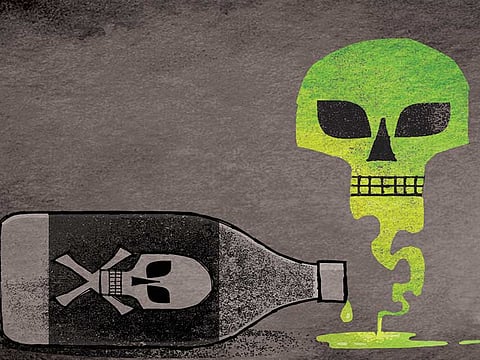When venomous ideas decline — and rise
The Daesh threat may have receded for now, but we ought to be watchful for perverted ideologies that will continue to sprout and thrive

The Anglo-American poet T.S. Eliot had it right when, contemplating the unspeakable devastation in post-First World War Europe, he wrote in his iconic 1925 poem, The Hollow Men, of how “this is the way the world ends, not with a bang but a whimper”, as did the Irish Modernist poet W.B. Yeats had it equally right when, contemplating the same scene, he wrote in his own, The Second Coming, in 1920, of how “the blood-dimmed tide is loosed, and everywhere the ceremony of innocence is doomed”.
Had these poets been our contemporaries, the teleological spirit of history that imbues their poems may as well have been a description of the wasteland that Daesh (the self-proclaimed Islamic State of Iraq and the Levant) has left behind as it retreats into oblivion with a whimper — at least as a proto-state.
As it retreats, the blood-dimmed tide it had loosed — atrocities that shake our sense of human being at its core, to its core — become more evident. Last Friday, the United Nations Office of the High Commissioner for Human Rights, issued a 53-page report about these atrocities, in Iraq alone, which included the execution of 741 civilians in Mosul, among them women and children, who had tried to flee during the nine-month battle by government forces to retake the city. Those executed were among well over 2,500 killed during the battle there, where Daesh “carried out mass abductions of civilians, used thousands of civilians as human shields in combat with Iraqi soldiers, and forcibly recruited boys as young as nine from families, then deployed them as ‘cubs of the caliphate’ wearing explosive belts”.
Zeid Ra’ed Al Hussain, the high commissioner for human rights, said: “Those responsible must answer for their heinous crimes.” Must indeed.
Today, Daesh, no longer has a territorial sanctuary it can call home. And this was a self-styled ‘caliphate’ that in its heyday seemed to project efficient determination, and that attracted into its orbit deluded youngsters from lands far and wide who, lacking intellectual heft and a penetrative grasp of what they were getting themselves into, thought they were witnessing the rise of a powerful social movement, a movement that would resurrect the golden age of “true Islam”, when Muslims were masters of their destiny, sitting athwart history, not importunate scarecrows, mendicants at the door of Western overlords. Today, the group is on the run, its leaders and cadres frantically looking for a place to hide. And everything has gone irrevocably south.
Or has it?
Let’s face it, from its inception not quite four years ago, Daesh was an idea, one that hit a chord with young, idealistic Muslims alienated from their world, East and West, who were in search of a muscular dream to dream, and Daesh cunningly was there for them. The group defined itself — and its recruits concurred with the definition — as the right idea, at the right time, responsive to the inward preoccupations, not only of its followers but of all Muslims. And these followers, even before transforming into caliphniks, had fallen victim to what political psychologists call “confirmation bias”, a bent of mind that leads people to subconsciously cherry pick information that reinforces their bias and ignore facts that are inconsistent with it — a true case of folks moved less by ideas than by id, less by intellect than by affect.
If you think that in modern times the Daesh experience is unique to our part of the world, consider Germany in the 1930s. Here’s a cultivated people — a people without whose contribution to the western intellectual tradition European civilisation would have been diminished — who readily embraced a venomous ideology like Naziism, that enshrined the code of the bully and the racist, but an ideology, nevertheless, that offered Germans relief from the humiliations imposed on them, as a vanquished people, by the Versailles Treaty in 1919. And consider Russia, around the same time, where in pursuit of the workers’ paradise and the Eden of the classless society, millions were starved and millions more worked to death in the Gulag, as totalitarianism reigned supreme.
And here’s the rub. Daesh may have been kicked out of house and home, its mythical ‘caliphate’ in tatters, but its adherents have always advanced it as an idea. An idea, regardless of its toxic hue, may decline, but its energies and instigations will not be wholly dispersed. There will always be those, with a nostalgia for its absolutes, who will aim to resurrect it, unless the social conditions that had enabled it to rise in the first place — that sense of inferiority and alienation that afflict a generation — are absent.
You will note, for example, that to this day, fascism in the Euro-American world, among those who feel inferior and alienated, is on the rise, as is totalitarianism in Russia. It is less difficult, you see, to create a new idea than to free yourself from an old one.
As Anne Applebaum, the Pulitzer Prize winner and columnist for the Washington Post, wrote in the lead sentence to her piece last Sunday: “Nothing is ever over. No historical trauma is ever resolved. No historic villain is ever buried, and no historic lessons are permanently learned. Everything and everyone can be revived, and anything can be unlearned — even in the most settled civilisations.”
True, but only when the stable, habitual landmarks by which one’s culture finds its bearings are shaken.
Fawaz Turki is a journalist, lecturer and author based in Washington. He is the author of The Disinherited: Journal of a Palestinian Exile.


